
Palestine is an 1803 romantic long poem by noted clergyman Reginald Heber, successfully entered for the Newdigate Prize.

Palestine is an 1803 romantic long poem by noted clergyman Reginald Heber, successfully entered for the Newdigate Prize.
Heber had been helped in this composition by Sir Walter Scott, a family friend, before the future novelist's years of fame. They'd had a discussion over breakfast about Palestine, and he began writing it before he left the table. [1] When Heber declaimed the poem at that year's Encaenia ceremony at the Sheldonian Theatre, it was given an enthusiastic reception. The poem was later published, and in 1812 was set to music by the composer William Crotch as an oratorio. [2] Crotch had been professor of music at Oxford since 1797. [2]
"None who heard Reginald Heber recite his ‘ Palestine’ in that magnificent theatre, will ever forget his appearance-so interesting and impressive. It was known that his old father was somewhere sitting among the crowded audience, when his universally admired son ascended the rostrum; and we have heard that the sudden thunder of applause which then arose so shook his frame, weak and wasted by long illness, that he never recovered it, and may be said to have died of the joy dearest to a parent's heart." —Charles E. Grey on Heber's recital of Palestine at the Sheldonian Theatre. [1]
Montefiore, writing in 1902, described the poem as "the most successful and popular piece of religious verse of the first half of the [19th] century". [3] A later biographer, Derrick Hughes, finds its contemporary acclaim puzzling: "It is not a good, not even a mediocre poem; it is leaden". [4] In the United States it was published as Palestine and other poems, and also included memoirs of Heber's life.

Edward James "Ted" Hughes was an English poet, translator, and children's writer. Critics frequently rank him as one of the best poets of his generation and one of the twentieth century's greatest writers. He was appointed Poet Laureate in 1984 and held the office until his death. In 2008, The Times ranked Hughes fourth on its list of "The 50 greatest British writers since 1945".

William Butler Yeats was an Irish poet, dramatist and writer, and one of the foremost figures of 20th-century literature. He was a driving force behind the Irish Literary Revival, and along with Lady Gregory founded the Abbey Theatre, serving as its chief during its early years. He was awarded the 1923 Nobel Prize in Literature, and later served two terms as a Senator of the Irish Free State.

William Wordsworth was an English Romantic poet who, with Samuel Taylor Coleridge, helped to launch the Romantic Age in English literature with their joint publication Lyrical Ballads (1798).

Sir Arthur Seymour Sullivan was an English composer. He is best known for 14 operatic collaborations with the dramatist W. S. Gilbert, including H.M.S. Pinafore, The Pirates of Penzance and The Mikado. His works include 24 operas, 11 major orchestral works, ten choral works and oratorios, two ballets, incidental music to several plays, and numerous church pieces, songs, and piano and chamber pieces. His hymns and songs include "Onward, Christian Soldiers" and "The Lost Chord".

Sheldonian Theatre, located in Oxford, England, was built from 1664 to 1669 after a design by Christopher Wren for the University of Oxford. The building is named after Gilbert Sheldon, Warden of All Souls College and later chancellor of the University. Sheldon was the project's main financial backer. The theatre is used for music concerts, lectures and University ceremonies, but not for drama until 2015 when the Christ Church Dramatic Society staged a production of The Crucible by Arthur Miller.

Jeremy Taylor (1613–1667) was a cleric in the Church of England who achieved fame as an author during the Protectorate of Oliver Cromwell. He is sometimes known as the "Shakespeare of Divines" for his poetic style of expression, and he is frequently cited as one of the greatest prose writers in the English language.

Richard Heber was an English book collector.
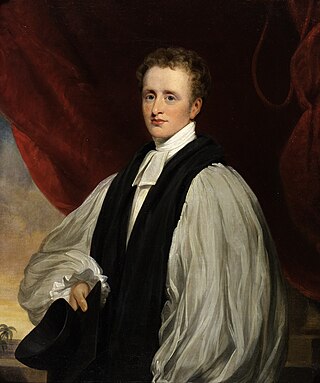
Reginald Heber was an English Anglican bishop, a man of letters, and hymn-writer. After 16 years as a country parson, he served as Bishop of Calcutta until his death at the age of 42. The son of a rich landowner and cleric, Heber gained fame at the University of Oxford as a poet. After graduation he made an extended tour of Scandinavia, Russia and Central Europe. Ordained in 1807, he took over his father's old parish, Hodnet, Shropshire. He also wrote hymns and general literature, including a study of the works of the 17th-century cleric Jeremy Taylor.

Sir Andrew Motion is an English poet, novelist, and biographer, who was Poet Laureate from 1999 to 2009. During the period of his laureateship, Motion founded the Poetry Archive, an online resource of poems and audio recordings of poets reading their own work. In 2012, he became President of the Campaign to Protect Rural England, taking over from Bill Bryson.
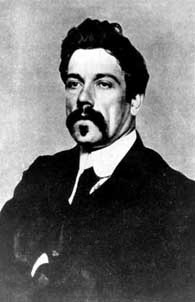
Edmund John Millington Synge was an Irish playwright, poet, writer, collector of folklore, and a key figure in the Irish Literary Revival. His best-known play The Playboy of the Western World was poorly received, due to its bleak ending, depiction of Irish peasants, and idealisation of parricide, leading to hostile audience reactions and riots in Dublin during its opening run at the Abbey Theatre, which he had co-founded with W. B. Yeats and Lady Gregory. His other major works include In the Shadow of the Glen (1903), Riders to the Sea (1904), The Well of the Saints (1905), and The Tinker's Wedding (1909).

Guy Reginald Bolton was an Anglo-American playwright and writer of musical comedies. Born in England and educated in France and the US, he trained as an architect but turned to writing. Bolton preferred working in collaboration with others, principally the English writers P. G. Wodehouse and Fred Thompson, with whom he wrote 21 and 14 shows respectively, and the American playwright George Middleton, with whom he wrote ten shows. Among his other collaborators in Britain were George Grossmith Jr., Ian Hay and Weston and Lee. In the US, he worked with George and Ira Gershwin, Kalmar and Ruby and Oscar Hammerstein II.

William Crotch was an English composer and organist. According to the British musicologist Nicholas Temperley, Crotch was "a child prodigy without parallel in the history of music", and was certainly the most distinguished English musician in his day.
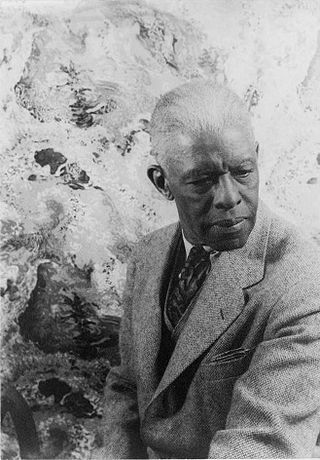
Roland Wiltse Hayes was an American lyric tenor and composer. Critics lauded his abilities and linguistic skills demonstrated with songs in French, German, and Italian. Hayes’ predecessors as well-known African-American concert artists, including Sissieretta Jones and Marie Selika, were not recorded. Along with Marian Anderson and Paul Robeson, Hayes was one of the first to break this barrier in the classical repertoire when he recorded with Columbia in 1939.

William Shakespeare's sexuality has been the subject of frequent debates. It is known from public records that he married Anne Hathaway and had three children with her; scholars have examined their relationship through documents, and particularly through the bequests to her in his will. Some historians have speculated Shakespeare had affairs with other women, based on contemporaries' written anecdotes of such affairs and sometimes on the "Dark Lady" figure in his sonnets. Some scholars have argued he was bisexual, based on analysis of the sonnets; many, including Sonnet 18, are love poems addressed to a man, and contain puns relating to homosexuality. Whereas, other scholars criticized this view stating that these passages are referring to intense platonic friendship, rather than sexual love. Another explanation is that the poems are not autobiographical but fiction, another of Shakespeare's "dramatic characterization[s]", so that the narrator of the sonnets should not be presumed to be Shakespeare himself.

"Holy, Holy, Holy! Lord God Almighty!" is a Christian hymn written by the Anglican bishop Reginald Heber (1783–1826).
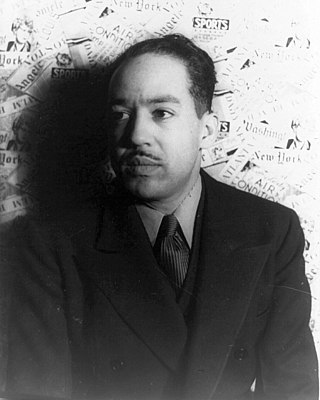
James Mercer Langston Hughes was an American poet, social activist, novelist, playwright, and columnist from Joplin, Missouri. One of the earliest innovators of the literary art form called jazz poetry, Hughes is best known as a leader of the Harlem Renaissance. He famously wrote about the period that "the Negro was in vogue", which was later paraphrased as "when Harlem was in vogue."
Montage of a Dream Deferred is a book-length poem suite published by Langston Hughes in 1951. Its jazz poetry style focuses on scenes over the course of a 24-hour period in Harlem and its mostly African-American inhabitants. The original edition was 75 pages long and comprised 91 individually titled poems, which were intended to be read as a single long poem. Hughes' prefatory note for the book explained his intentions in writing the collection:
In terms of current Afro-American popular music and the sources from which it progressed—jazz, ragtime, swing, blues, boogie-woogie, and be-bop—this poem on contemporary Harlem, like be-bop, is marked by conflicting changes, sudden nuances, sharp and impudent interjections, broken rhythms, and passages sometimes in the manner of a jam session, sometimes the popular song, punctuated by the riffs, runs, breaks, and disc-tortions of the music of a community in transition.

Robert Streater (1621–1679), was an English landscape, history, still-life and portrait artist, architectural painter, and etcher. He was Serjeant Painter to King Charles II, and decorated the ceiling of Christopher Wren's Sheldonian Theatre in Oxford.
William Money Hardinge (1854-1916) was an English poet and author.
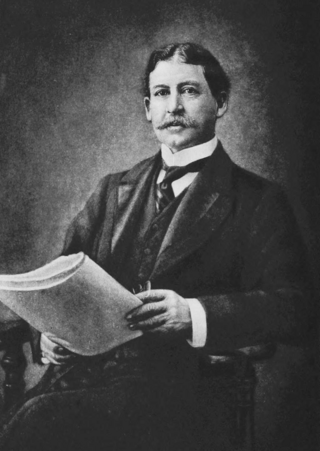
Heber Reginald Bishop was an American businessman and philanthropist of the late 19th and early 20th centuries. His collections of art, especially his noted collection of jade, were donated to museums. Bishop was a Trustee of the Metropolitan Museum in New York City during its early years.